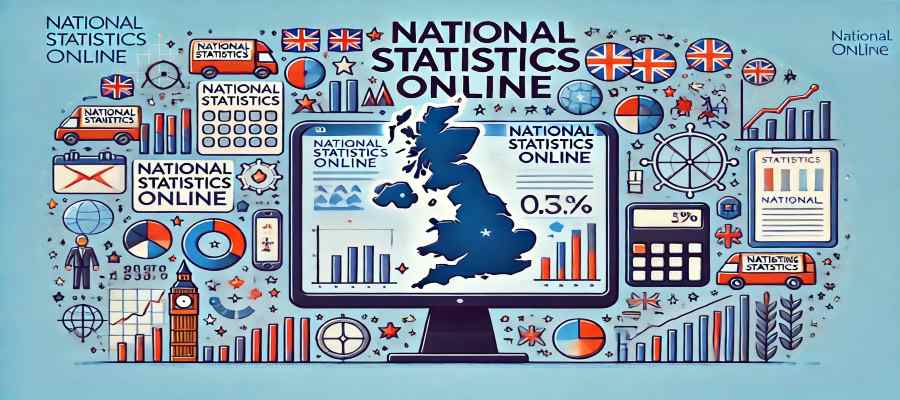In today’s data-driven world, the accessibility of national statistics online has become an essential resource for researchers, policymakers, and the general public. These statistics provide a wealth of information that helps us understand various aspects of our society, economy, and environment. From demographic data to economic indicators, the availability of national statistics online ensures that anyone with an internet connection can access vital information for their needs. This article will explore the significance of national statistics, where to find them online, and how to utilize this data effectively. Whether you are conducting research, making policy decisions, or simply curious about the state of the nation, national statistics online offer a valuable tool for comprehensive data analysis.
National Statistics Online
National statistics online provide a wealth of data on various aspects of a country, accessible to anyone with internet access. These statistics cover demographics, economy, health, education, and more, helping users make informed decisions based on accurate data.
Importance Of National Statistics
National statistics are crucial for understanding the current state and trends within a country. These data sets offer insights into population demographics, economic performance, health outcomes, education levels, and more. By analyzing national statistics, researchers can identify patterns and trends that inform policy decisions and strategic planning. For instance, demographic data can reveal shifts in population age groups, helping governments plan for future healthcare and education needs. Similarly, economic statistics such as GDP, unemployment rates, and inflation provide a snapshot of the country’s economic health, guiding fiscal and monetary policies.
The accessibility of national statistics online democratizes data, allowing not only policymakers but also businesses, academics, and the general public to engage with this information. This transparency fosters an informed citizenry, enabling people to participate more effectively in democratic processes and societal debates. Additionally, businesses can leverage national statistics for market research, helping them identify opportunities and mitigate risks.
Moreover, national statistics are vital for international comparisons. They allow countries to benchmark their performance against others, identify best practices, and learn from the successes and challenges of their peers. This global perspective is particularly important in addressing transnational issues such as climate change, economic inequality, and public health crises.
The use of national statistics extends to various fields, including healthcare, education, and urban planning. In healthcare, for example, statistics on disease prevalence, vaccination rates, and healthcare access inform public health initiatives and resource allocation. In education, data on student performance, school enrollment, and literacy rates guide policies aimed at improving educational outcomes. Urban planners rely on statistics related to housing, transportation, and infrastructure to design sustainable and livable cities.
Overall, the importance of national statistics cannot be overstated. They provide a foundation for evidence-based decision-making, fostering a more informed and proactive society. The availability of this data online enhances its utility, making it easier for all stakeholders to access and apply the information in meaningful ways.
Accessing National Statistics Online
1. Government Websites
Government websites are the primary source of national statistics. Most countries have dedicated statistical agencies that collect, analyze, and publish data on various aspects of national life. These websites often provide user-friendly interfaces and search tools to help users find specific datasets.
2. International Organizations
International organizations such as the World Bank, United Nations, and International Monetary Fund also offer national statistics. These platforms provide a global perspective, allowing users to compare data across different countries and regions.
3. Research Institutions
Many research institutions and universities maintain databases of national statistics. These sources are particularly valuable for accessing specialized data and academic research that may not be available through government portals.
4. Data Portals and Repositories
Data portals and repositories, such as Data.gov in the United States, provide centralized access to a wide range of national statistics. These platforms often include data visualization tools and APIs for developers, enhancing the usability of the data.
Benefits Of Using National Statistics
Using national statistics provides numerous benefits, including:
- Informed Decision-Making: Access to accurate data enables better policy and business decisions.
- Transparency: Publicly available statistics foster transparency and accountability.
- Research and Analysis: National statistics are essential for academic and market research.
- International Comparisons: Comparing data across countries helps identify global trends and best practices.
- Resource Allocation: Data-driven approaches improve the allocation of resources in various sectors.
Challenges In Accessing National Statistics
Despite the benefits, accessing national statistics online can present challenges. One significant issue is data quality. Not all data sources are equally reliable, and discrepancies can arise from differences in data collection methods, definitions, and reporting standards. Users must critically evaluate the credibility of the data sources they use.
Another challenge is data accessibility. While many government websites and international organizations provide free access to national statistics, some data may be behind paywalls or require special permissions. This can limit access for individuals and organizations with limited resources.
Finally, there is the issue of data literacy. Access to data alone is not enough; users must also possess the skills to interpret and analyze the information correctly. This underscores the importance of education and training in data literacy to maximize the utility of national statistics.
Applying National Statistics
Market Research
Businesses can use national statistics to conduct market research, identifying trends and consumer behavior to inform product development and marketing strategies.
Strategic Planning
National statistics provide insights into economic conditions and industry performance, helping businesses develop long-term strategies and mitigate risks.
Competitive Analysis
By comparing national statistics, businesses can benchmark their performance against competitors and identify opportunities for improvement.
Conclusion
National statistics online provide invaluable insights into various aspects of a country’s performance and development. These data sets are essential for informed decision-making in policy, business, and research. By leveraging national statistics, stakeholders can drive progress and innovation, contributing to a more informed and proactive society.
FAQs
What Are National Statistics?
National statistics are data sets that provide information on various aspects of a country’s demographics, economy, health, education, and more.
Where Can I Find National Statistics Online?
You can find national statistics on government websites, international organization platforms, research institutions, and data portals.
Why Are National Statistics Important?
National statistics are important because they inform decision-making, foster transparency, support research, enable international comparisons, and improve resource allocation.
How Do Businesses Use National Statistics?
Businesses use national statistics for market research, strategic planning, and competitive analysis to make informed decisions and identify opportunities.
What Challenges Exist In Accessing National Statistics Online?
Challenges include data quality, accessibility issues, and the need for data literacy to correctly interpret and analyze the information.










